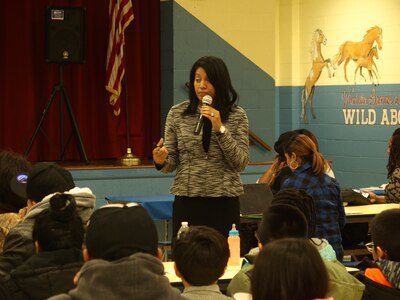A new partnership between a teacher training program and Shelby County Schools to transform a low-performing school into a literacy lab is ending before it was to begin.
With the alliance between Winchester Elementary School and the Memphis Teacher Residency tabled amid community backlash, the school will instead enter the Memphis district’s Innovation Zone, a seven-year-old turnaround program that is seen as widely successful. This fall, Winchester will be among 12 schools entering the program, the most at once in the program’s history.
During a community meeting earlier this year, parents and teachers at Winchester were largely critical of the partnership — saying the teachers would be less experienced, the model hasn’t been tested, and the school had recently undergone a lot of leadership changes, and wanted ways to improve academics that didn’t involve a lot of shake up.
The 11-year-old Memphis Teacher Residency pairs college graduates working on their master’s degree in education with teachers for one year, and then places them in high-need Memphis classrooms with coaching support. Under the new partnership, the teacher training program would have staffed up to half of the school, adding more literacy coaching and instruction. The teacher training program has recruits in more than 30 schools across Memphis, but had never staffed a literacy lab of this sort.

Sherrie Partee, a volunteer parent liaison at the school, said under the iZone transition, she and other parents have helped interview incoming teachers for the fall.
“This is not a test program. This is not student teachers. This is teachers that are already in the district,” Partee said, contrasting the iZone to the residency program. She said she was impressed with the iZone schools she visited.
Natalia Powers, a spokeswoman for the district, cited community pushback as the reason for the switch to the iZone. “We already have a model that works,” she told Chalkbeat.
David Montague, the CEO of Memphis Teacher Residency, agreed that the community response “made the idea less attractive for all.”
The district had chosen the teacher training program because its graduates have shown to improve student test scores more than teachers with the same years of experience who were not in the program, according to district data. About 91% of teacher residents in the program finish their three-year teaching commitment.

Winchester became a “priority” school in September after its students repeatedly performed in the bottom 5 percent academically on state tests. The school’s longtime principal had recently retired and her replacement only stayed for a few months before an interim leader was named.
The recent leadership instability makes the school a better candidate for large-scale changes, according to district leaders.
Winchester’s new principal, Kamiah Turner, is coming from Douglass K-8, a school that the state flagged as low-performing in 2012 and improved enough to escape that designation two years later. Partee, the parent liaison, said several of the new teachers are coming with Turner from Douglass.

